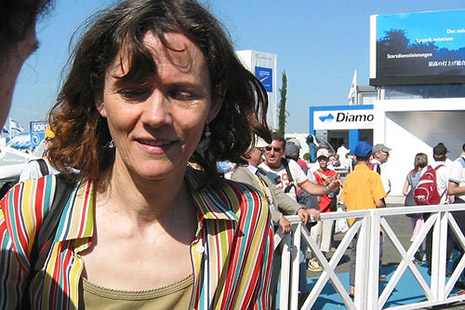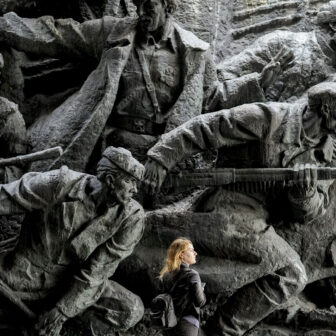The Night Cleaner
By Florence Aubenas | Polity Press | $29.95
There didn’t used to be any limits to the length of these interviews. Orders from above started to restrict them to half an hour, and then twenty minutes. Between colleagues, the phrase used is a “rush job,” everyone is reluctant to do it like that, but the directives are clear: “You’re not social workers any more — those days are over. We need figures. Start calling the job-seeker a ‘client.’ It’s official: this is the word from on high.”
Set against a backdrop of featureless fluorescent-lit offices and reception areas and an endless succession of beige job expos, Florence Aubenas’s The Night Cleaner chronicles the search for a job at the height of the slump that began in 2008. The respected French journalist had been writing and talking constantly of “the recession,” and yet she felt disconnected from what the word really meant. “It seemed to me, all of a sudden, as devalued as the shares in the stock market.” Her solution was to jump the divide and plough head first into an unemployment queue.
In the tradition of Fran Abrams’s Below the Breadline, Elisabeth Wynhausen’s Dirt Cheap and Barbara Ehrenreich’s Nickel and Dimed, Aubenas went undercover, assuming the identity of a middle-aged woman with no employment history and no job prospects — in the language of the system, a “statistical high risk.” But she pledges to continue her search until she attains a full-time job, and in the process becomes another problem for employment agency workers at Pole Emploi as they drown under the weight of statistics and targets. Reduced to an object of management speak, she is advised to turn to a “particular speciality — cleaner.”
As Europe continues to rupture under the weight of the Greek debt crisis, Italy teeters, and talk circles around the possibility of the break-up of the euro, Aubenas’s account, although based on events two years ago, is still very relevant. In 2009, she writes, the recession was already something that “happened a very long time ago, ages and ages ago, last year…” It is a one-off event, and it comes without warning — the jobs simply fall through the floor.
“Suddenly, during winter 2008, we were officially declared to be in recession,” she writes. “The radio talked about it morning, noon and night. Every day, 3000 more unemployed signed on with the agencies, and in a few weeks the administration found itself struggling under the weight of 70,000 unexamined files. Such a thing had never been seen before.”
Alone and anonymous, she takes residence in the city of Caen, as featureless as the offices she cleans, and literally neither here nor there, “neither too far north nor too far south, neither too big nor too small.” She limps along the highways of Caen in her bomb of a car following up job interviews, only to be told when she arrives that the position has been filled.
In the town’s prime, more than 20,000 people worked in the eight big factories that circled Caen, “all pointed to as an example of how France was able to combine its fields of potatoes with its coke furnaces, and how the country had picked itself up after the war and was decentralising its industries and marshland, ducks, and bombed-out buildings.” Now, the buildings rot around her, and she could be anywhere, in any city across Europe or America, in cities and towns hollowed out, directionless, without community, without a centre.
Like those of her fellow job-seekers, Aubenas’s needs are simple. She wants something that pays at least the minimum wage, boasts a back-to-back shift, doesn’t require a three-hour drive across town eating up half her pay packet in petrol, and won’t break her back. And yet, as a client of Pole Emploi, she must endure master classes in massaging her CV and day-long clinics on “The Cleaning Professions.” Her “main specialties” on her freshly reworked CV are listed as “the routine cleaning of premises and work services, picking up waste paper, cleaning furniture and accessories (ash trays, waste paper baskets, etc), management and follow up of jobs at various sites.”
Trudging into the darkness of the day to begin work, huddling in idling cars waiting for offices to open — biding time is the hallmark of this book. Aubenas’s life of queuing, endless interviews and filling time between shifts is punctuated by short bursts of equally monotonous but nail-bleeding work.
Her description of one of the eight Pole Emploi sites around town captures her state of being — always restless, always on call, never at ease, at home nowhere:
Everything seems designed to create a sense of almost blank discomfort, where nothing invites you to settle down, or even to linger any longer than the time absolutely necessary for the formalities. The room is a big lobby which acts simultaneously as a reception desk, a waiting room, and a telephone cabin for people to pursue their quest. You can also consult the job offers on computers. These functions are not separated by any partitions, and everyone is standing, behind counters as tall as a man, so that the people, the agency’s advisors included, seem to be floating around the draughty space, between the drab coloured walls.
The people Aubenas encounters during her search for work — the cleaners, queue members, agency workers — also seem to float. They are featureless, in limbo, and yet there are moments when their frustration suddenly punctuates the text: when an angry outburst interrupts the fluorescent hum of the job agency waiting room as a desperate job seeker shouts that they “just need to work,” or in the story of the “Moulinex girls,” fiercely proud women who mourn the loss of their beloved workplace, one of the first factories where women could work in the sixties, and the “last big one to close down, in 2001, after negotiations in Paris, marches, and coverage in all the French media.”
There’s Victoria, the seventy-something-ish woman who’s been a cleaner, and union member, all her life; Phillipe, who simply longs to get back behind the wheel of a car he can’t afford, to assume the stature of someone with a set of wheels; and the elderly couple marching in a union rally gently berating their children for their grudging attendance.
Although it is enormous, this rally that features halfway through the book, it doesn’t compare to the violent union protests of the seventies, Aubenas notes; it’s a demonstration that has no anger in it, “no real slogans, as if its only claim is in its sheer mass.” She observes that this giant march of people “no longer seems to be borne along by certainties or grievances, but merely crisscrossed by questions which fly from one group to the next: ‘How many of us are there? What are we going to do? How long is it going to last? Where are we going?’” Their questions anticipate those of the students at the Spanish education protests, the angry Greek rioters, the Italians who camped out baying for Berlusconi’s blood, and the 99 per cent of the Occupy movement.
Aubenas ultimately washes into the beige walls and attains the anonymity of a cleaner: slipping around the halls of a ferry at night staying out of sight of the passengers; knocking over a pail of dirty water across a freshly waxed floor and cleaning it on hands and knees as the arriving office workers step around her; and tending to the coffee stains and mess in yet another office. Her identity is erased entirely in one confronting moment when she realises that two office workers who’ve stayed back late have begun to have sex in front of her as she vacuums in the corner. Aware of her presence under the fluorescent lights, they remain completely oblivious to her shock and discomfort as the vacuum hums over their grunts.
This is an uncompromisingly bleak account of the search for humanity in the dehumanising search for work. Aubenas’s methodical account might be grinding and unsentimental at times, yet she gives voice to the anger and helplessness of the case workers and the clients united in a common goal: to shift their vast numbers off the employment agency’s books.
Now more than ever it is a stark reminder of the gap between the headlines of the European meltdown and the reality of the lives of people who have fallen, and will continue to fall, through the cracks. •




